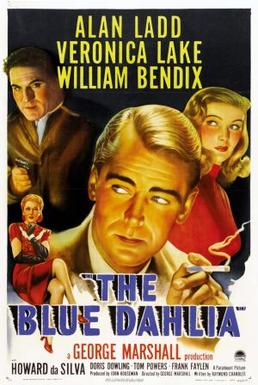 Soldiers returning home from war is a recurring theme in films such as The Best Years of Our Lives and Act of Violence and given the circumstances it makes sense. This was the reality. Men returning home from war as heroes. But even heroes have to re-acclimate to the world they left behind.
Soldiers returning home from war is a recurring theme in films such as The Best Years of Our Lives and Act of Violence and given the circumstances it makes sense. This was the reality. Men returning home from war as heroes. But even heroes have to re-acclimate to the world they left behind.
Blue Dahlia is not so much about the assimilation of G.I.s though. It’s more an excuse to show the noir world creeping into a man’s life infecting all he left behind. As he returns, Johnny Morrison’s wife (Doris Dowling) is keeping company with another fellow (Howard Da Silva) and everyone else seems to know about it except Johnny. Also, his young boy died tragically while he was away and his wife has taken to a life of drinking and partying. He’s not expecting any of this but then again what happens in film-noir is very rarely what we expect.
Raymond Chandler weaves together his first original screenplay here, a production that was hampered by the impending deployment of Alan Ladd as well as Chandler’s own bouts with alcoholism and writer’s block. It’s hard to know which one caused the other. But either way, the film finds its roots in a murder and the man who is suspect just happens to be the returning G.I. Before he ever knew people were looking for him he playfully took the name Jimmy Moore after meeting a lady (Veronica Lake) who happens to be closer to him than either of them realize. Their paths cross more than once.Then he’s on the run. His war buddies (Hugh Beaumont and William Bendix) are worried about him after being questioned by the cops. And the cops are anxious to hone in on the killer because no one is of any real help. No solid leads come their way and that means Johnny has to track down the killer himself.
The direction of George Marshall is not particularly inspired but his players are compelling enough. Alan Ladd can still play the brusque tough guy and William Bendix steals the show with his own blue-collar bravado and snarling bluster. Veronica Lake doesn’t show up until well into the film and in many ways, despite her billing, she feels relegated to a smaller role. She’s not particularly memorable in the majority of it even with her scenes with Ladd. She’s mostly just there which is grossly unfortunate. It feels like a waste.
After the novelty of Hugh Beaumont wears off it makes sense why he transitioned to TV while Howard Da Silva and Doris Dowling denote a certain sleaze that comes off quite well. Meanwhile, Frank Faylen plays an integral role as one of his typical curmudgeon types. He made a killing off of that niche. Still, Ladd and Bendix are the main attraction in this adequate serving of film-noir. On a darker note, this film also gave its name to the unsolved Black Dahlia killing of Elizabeth Short in 1947. It’s one time when perhaps reality was more tragic than fiction. Raymond Chandler could not have even dreamed up such a grisly drama. At least not for the silver screen.
3.5/5 Stars

I have a huge affection for this movie in that it was the one that plummeted me head-first into an adoration for film noir: yes, I’d seen noir movies before and, yes, I’d enjoyed them, but here was the movie that suddenly made me aware of a genre that I immediately came to love.
Veronica Lake . . . is not particularly memorable
Say that for yourself. The movie also initiated my still-ongoing pash for Veronica Lake. My wife tells me repeatedly that Lake is far too memorable here; mind you, I Married a Witch, oh lordie . . .
LikeLiked by 1 person
That’s wonderful to hear! Now this makes we want to go back and figure out what film noir did it for me (maybe Laura or Out of the Past). I doubt I have as much knowledge on the subject but it still has to be my favorite genre, style, movement–whatever you want to call it.
I too am a Veronica Lake fan. I think Sullivan’s Travels and I Married a Witch did it to me. I also enjoyed This Gun for Hire and a brief cameo in Hold Back the Dawn. But something about her performance in Blue Dahlia just didn’t resonate with me for some reason which I probably didn’t articulate very well. Your words make me want to go back and watch it again so thanks for that. Can never have too much film noir!
LikeLike
Pingback: Bitter Rice (1949) | 4 Star Films